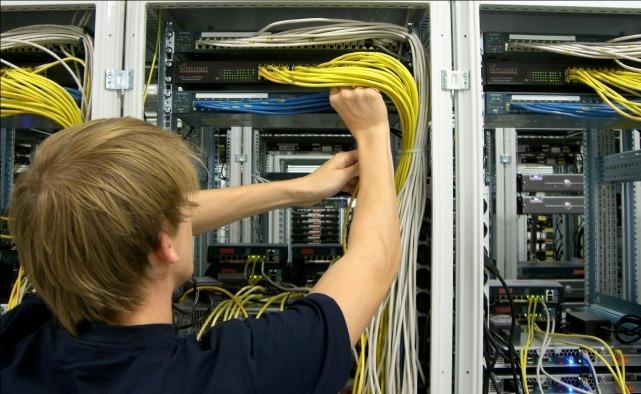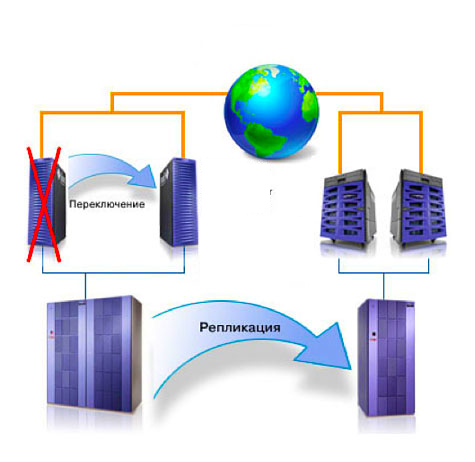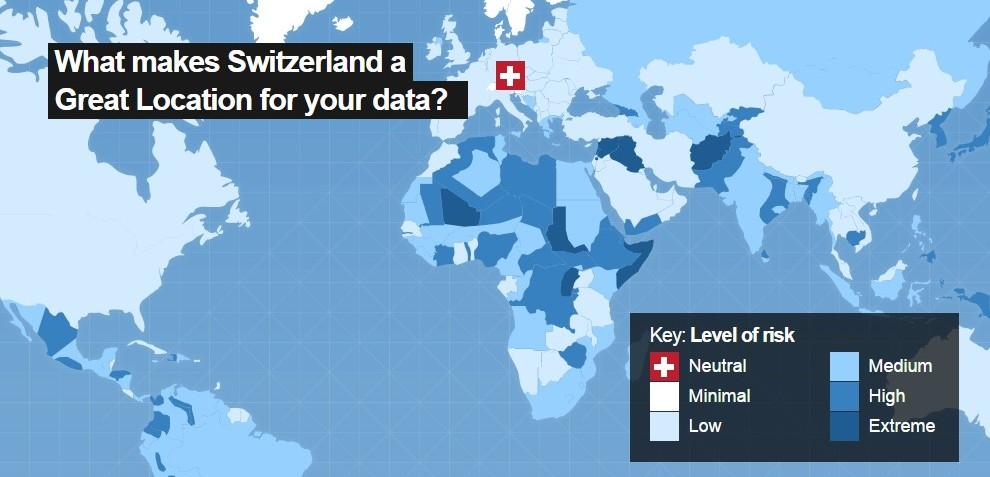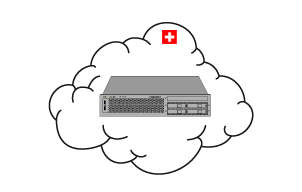Server abroad
Today, many companies, not wanting to assume the costs of purchasing and maintaining physical servers, choose virtual sites. Using the services of a hosting provider, you can create a high-quality Internet portal. And at the same time the technical support team will be engaged by the provider. In modern Russian data centers, reliable data storage systems are used, high uptime performance is achieved due to duplication of engineering infrastructure components, guaranteed backup is implemented. However, in some cases, customers resort to the services of foreign data centers. Why?

As a rule, the IT infrastructure of foreign data centers is the latest generation of advanced equipment, quality standards according to ISO 9001 and ISO 27001, high level of security and control of data storage, SLA (Service Level Agreement) - standard (availability 99.5%) and individual (up to 99.995%). To ensure data security, they use the latest IT solutions, firewalls, encryption technology of communication channels. The power supply of the data center is also implemented with a high level of reliability - up to TIER IV (all duplicated).
How else can a foreign data center be of interest to Russian customers? Companies that provide hosting abroad, as a rule, have very flexible tariff plans. They strive to provide the client with a full package of services for practically the same money as the basic option. Considering such a service as a foreign client hosting is also driven by the high quality of the service, the greater experience of the staff, the high speed of response to problems. Any malfunction will be repaired as quickly as possible.
')

In Europe, data centers work people involved in hosting services for many years, so they know how to prevent the emergence of some problems, how to fix problems that have arisen as soon as possible.
For many domestic companies, an additional platform abroad is also business protection. The seizure of data center equipment, illegal blocking, long-term outages - in Russia, all this has to be taken into account as risk factors when placing or renting physical or virtual servers.
In addition, companies are increasing the need to make online transactions more secure from government surveillance and cybercriminals. Therefore, those who need a server with data protection from unauthorized access and a guarantee of reliable operation are often considered the option of renting a server abroad. Finally, the financial stability of European data center operators is another risk reduction factor.
Experts give some useful tips on how to run an Internet business in the Russian Federation and avoid problems:
Server rental abroad and the above tips are relevant for businesses in the Russian Federation that do not work with personal data of users. Since September 1, 2015, amendments to the Law No. 152- “On Personal Data” are in effect, according to which the storage and processing of personal data of Russian users is carried out only in Russia. Otherwise, the resources of companies located in the data centers of foreign providers may be blocked by Roskomnadzor. Only impersonal personal data can be stored in international data centers.

Foreign data centers are also stability. It implies both a favorable political and economic situation abroad, and uninterrupted data center operation. Clients of such hosting sites can be sure about the future of their web projects.
Meanwhile, thanks to encryption, data center employees may not have access to your data at all. Data abroad will be fully protected. The problem is the requirements of the Russian legislation, according to which it is necessary to use encryption tools certified by the FSB and FSTEC. It is hardly possible to convince a foreign data center provider to use Russian encryption tools, and certification in Russia of foreign encryption tools is too expensive: hosting will be unprofitable. And this is another problem. In addition to the restrictions imposed by Russian legislation, a user of foreign hosting may face the specific requirements of local regulators.
Finally, another drawback is certain inconveniences when paying for services of foreign providers that use systems adopted in a particular country or international services, while Russian companies introduce payment methods that are most comfortable for customers.
A reasonable compromise between domestic and foreign sites is the choice of a domestic hosting provider that has sites both in Russia and abroad. In Russia, the mixed model has already gained popularity, when a part of corporate data is located in the Russian Federation, and a part is exported abroad. Russian hosting providers take into account the wishes of customers and offer customers such a mixed type of data placement. Clients also pursue different goals.
Often the company's IT strategy requires at least two data centers - the main and the backup. And this is not by chance. After all, the loss of information or control over it at best guarantees big losses, at worst this is a complete loss of business. Therefore, the deployment of the main and backup data center for a serious company today is strategically necessary and justified. It is clear that this is not cheap, but there is another solution - hosting.

Backup data center allows you to eliminate downtime and ensure the possibility of immediate restoration of the server systems in case of failure and a serious accident.
The use of a hosting service provider’s foreign site as a backup data center is the minimization of both risks and costs. With such a scheme of work achieved maximum safety and reliability. From the point of view of competent construction of the smooth operation of the sites, this is the right decision.
According to statistics , Russian companies consider the majority of projects using foreign data centers from the point of view of creating two separated sites and risk minimizing systems. Thus, using the services of the main and / or backup data center in Europe is not only protection against corporate raid and administrative pressure, but also diversification of risks, creation of a highly reliable distributed IT infrastructure.
If the target audience of the site is Russian-speaking users, placing the resource on geographically remote servers can increase the response time of the site (although not always), and vice versa. In some cases, foreign data centers will be a good option for companies whose business is focused on the foreign market, in particular, operating in the European market.
The overseas site can be used to place data in order to connect European customers to it. The cost of traffic will be significantly less. In addition, servers based in foreign data centers show the best response time for European users. Such data centers have direct access to European traffic exchange points. For example, for traders, when working on the foreign exchange market, the delay in receiving and sending data is critical, and when hosting on a foreign site, it will be much less than when working from Moscow or Samara. Delays have to be taken into account when placing game servers (which leads to lower lags in computer games), creating content delivery networks (CDN). Placing data centers near customers is often forced by companies with a large international reach.
Moreover, due to the weak development of the Russian networks and the peculiarities of their organization, traffic from the Moscow provider to the regions often goes through Europe. Connectivity with the European data center is often better than with Moscow. And in general, the connection may be more reliable and better.
Russian hosting companies are increasingly offering hosting abroad and at the same time can adequately compete with foreign hosts. In particular, the company RuVDS, a dynamically developing hosting provider specializing in providing corporate-class IaaS services, whose partners include major financial institutions, a number of commercial banks and social projects, plans to expand the list of services by providing foreign hosting clients, for which it has with a European data center (Switzerland), where customer resources will be located.
The conclusion of service contracts, financial, legal issues, technical support will be provided by RuVDS: the client will not have to interact with the foreign provider himself, adapt to his regulatory environment and terminology. And while the cost of services will be quite competitive.
Switzerland today is positioning itself as a global data warehouse. Now it is one of the safest jurisdictions for hosting data centers. The key advantage for the development of this business in the country has become the strict laws of Switzerland, as a tribute to banking traditions.

One of the advantages of hosting in Switzerland is that the state protects the physical access to the data of the client company.
Today, Swiss data centers offer their services to any company that is looking for a stable storage location in Europe. In particular, since the former US National Security Agency contractor, Edward Snowden, has given publicity documentary evidence of extensive government surveillance, data center owners in Switzerland have been seeing an increase in demand for secure data storage services from the United States.

Switzerland is classified as a country with minimal risk when posting data.
Switzerland has established itself as an island of stability, able to withstand financial and geopolitical upheavals. Such fundamental stability is the guarantor of the security of your web resource. The political and financial stability of this country is in itself a weighty, but not the only argument.
 Switzerland is located in the center of Western Europe, in close proximity to the leading European countries with a strong economy and business activity, millions of potential customers of companies doing business in Europe. Due to direct connection to leading providers, such a data center can significantly reduce the response time to requests from Europe, Asia and America. This means a quick response for the end user, regardless of his geographical location.
Switzerland is located in the center of Western Europe, in close proximity to the leading European countries with a strong economy and business activity, millions of potential customers of companies doing business in Europe. Due to direct connection to leading providers, such a data center can significantly reduce the response time to requests from Europe, Asia and America. This means a quick response for the end user, regardless of his geographical location.
The technological development of Switzerland in conjunction with the data center infrastructure allows us to provide hosting services of the highest quality, to provide a high level of customer service. The equipment used meets the highest standards of performance and safety. Innovative security measures and effective management help avoid potential risks. Modern equipment protects client resources from powerful TCP / UDP attacks such as DDoS - up to 10 Gbit / s or 4 million packets per second.

Switzerland can be considered the perfect location for the data center.
Foreign data centers are now actively interested in large and medium-sized businesses — legal, pharmaceutical and financial investment companies, retailers. Can grow interest and from media resources. An important advantage of Russian hosting providers offering their services on the basis of a foreign platform is the presence of a Russian-speaking technical support service, which is not always offered by foreign providers. The language barrier can be a significant obstacle. Russian hosting providers have this problem resolved automatically. In addition, now for the convenience of customers, various channels of communication are involved.

Russian hosting providers are well aware of the problems and requirements of Russian customers, and this often helps to resolve issues that have arisen as soon as possible, using the most appropriate tools for this.
Many of the situations typical of Russia for foreigners are often difficult not only to resolve, but also to grasp their essence. The Russian provider is easier to find a way to help the client.
RuVDS services are focused primarily on the corporate segment: government agencies, banks, stock market players. RuVDS servers are located in their own state-of-the-art data center in Korolyov near Moscow, and the high speed of work and flexible tariff plans make web hosting very attractive for customers.
Russian hosting provider RUVDS, with the support of Huawei, has commissioned a TIER IV reliability zone at the Deltalis data center in Attinghausen, Switzerland. It is designed to provide VPS / VDS virtual server rental services to customers. Huawei made the last generation telecommunications equipment supplier, as well as engineering solutions for the organization of the virtual environment.
The implementation of the project in Switzerland ensures a high level of data security - technological and legal - as well as the optimization of access speed for European customers due to the convenient geographical location of the containment zone (a modular unit of the data center of the highest reliability class currently). VPS services will be offered to both Russian and foreign customers of RUVDS. According to RUVDS Managing Director Artyom Fedoseyev, prices for VDS / VPS services in Switzerland will not differ from those in the current RUCLOUD data center in Moscow, which will allow customers to choose the most convenient virtual server location for one of the lowest in the market. price
In the future plans of the company - the creation of a universal product, equally suitable for any purpose and at the same time accessible to all users at a price. The site in Switzerland will allow us to offer a wider choice of services to customers from various industries.

Foreign data center: pros and cons
As a rule, the IT infrastructure of foreign data centers is the latest generation of advanced equipment, quality standards according to ISO 9001 and ISO 27001, high level of security and control of data storage, SLA (Service Level Agreement) - standard (availability 99.5%) and individual (up to 99.995%). To ensure data security, they use the latest IT solutions, firewalls, encryption technology of communication channels. The power supply of the data center is also implemented with a high level of reliability - up to TIER IV (all duplicated).
How else can a foreign data center be of interest to Russian customers? Companies that provide hosting abroad, as a rule, have very flexible tariff plans. They strive to provide the client with a full package of services for practically the same money as the basic option. Considering such a service as a foreign client hosting is also driven by the high quality of the service, the greater experience of the staff, the high speed of response to problems. Any malfunction will be repaired as quickly as possible.
')

In Europe, data centers work people involved in hosting services for many years, so they know how to prevent the emergence of some problems, how to fix problems that have arisen as soon as possible.
For many domestic companies, an additional platform abroad is also business protection. The seizure of data center equipment, illegal blocking, long-term outages - in Russia, all this has to be taken into account as risk factors when placing or renting physical or virtual servers.
In addition, companies are increasing the need to make online transactions more secure from government surveillance and cybercriminals. Therefore, those who need a server with data protection from unauthorized access and a guarantee of reliable operation are often considered the option of renting a server abroad. Finally, the financial stability of European data center operators is another risk reduction factor.
Experts give some useful tips on how to run an Internet business in the Russian Federation and avoid problems:
- Register domains abroad - outside the .ru zone and with well-known registrars.
- Register your company abroad. Create a parent and subsidiary. The first will own the technology, and the second will license it. This will protect the main intellectual asset.
- Use the services of several data centers. Even abroad there is a possibility of blocking a server or data center by a court decision. Important data must be duplicated on equipment located not only in another data center, but also under a different jurisdiction.
- Place databases abroad. Keep accounting on foreign servers and work on a VPN. You can instantly restore office work.
- Document everything regarding the installed software. Take care of the necessary level of protection of servers and local network.
Server rental abroad and the above tips are relevant for businesses in the Russian Federation that do not work with personal data of users. Since September 1, 2015, amendments to the Law No. 152- “On Personal Data” are in effect, according to which the storage and processing of personal data of Russian users is carried out only in Russia. Otherwise, the resources of companies located in the data centers of foreign providers may be blocked by Roskomnadzor. Only impersonal personal data can be stored in international data centers.

Foreign data centers are also stability. It implies both a favorable political and economic situation abroad, and uninterrupted data center operation. Clients of such hosting sites can be sure about the future of their web projects.
Meanwhile, thanks to encryption, data center employees may not have access to your data at all. Data abroad will be fully protected. The problem is the requirements of the Russian legislation, according to which it is necessary to use encryption tools certified by the FSB and FSTEC. It is hardly possible to convince a foreign data center provider to use Russian encryption tools, and certification in Russia of foreign encryption tools is too expensive: hosting will be unprofitable. And this is another problem. In addition to the restrictions imposed by Russian legislation, a user of foreign hosting may face the specific requirements of local regulators.
Finally, another drawback is certain inconveniences when paying for services of foreign providers that use systems adopted in a particular country or international services, while Russian companies introduce payment methods that are most comfortable for customers.
A reasonable compromise between domestic and foreign sites is the choice of a domestic hosting provider that has sites both in Russia and abroad. In Russia, the mixed model has already gained popularity, when a part of corporate data is located in the Russian Federation, and a part is exported abroad. Russian hosting providers take into account the wishes of customers and offer customers such a mixed type of data placement. Clients also pursue different goals.
Reserve site
Often the company's IT strategy requires at least two data centers - the main and the backup. And this is not by chance. After all, the loss of information or control over it at best guarantees big losses, at worst this is a complete loss of business. Therefore, the deployment of the main and backup data center for a serious company today is strategically necessary and justified. It is clear that this is not cheap, but there is another solution - hosting.

Backup data center allows you to eliminate downtime and ensure the possibility of immediate restoration of the server systems in case of failure and a serious accident.
The use of a hosting service provider’s foreign site as a backup data center is the minimization of both risks and costs. With such a scheme of work achieved maximum safety and reliability. From the point of view of competent construction of the smooth operation of the sites, this is the right decision.
According to statistics , Russian companies consider the majority of projects using foreign data centers from the point of view of creating two separated sites and risk minimizing systems. Thus, using the services of the main and / or backup data center in Europe is not only protection against corporate raid and administrative pressure, but also diversification of risks, creation of a highly reliable distributed IT infrastructure.
Closer to customer
If the target audience of the site is Russian-speaking users, placing the resource on geographically remote servers can increase the response time of the site (although not always), and vice versa. In some cases, foreign data centers will be a good option for companies whose business is focused on the foreign market, in particular, operating in the European market.
The overseas site can be used to place data in order to connect European customers to it. The cost of traffic will be significantly less. In addition, servers based in foreign data centers show the best response time for European users. Such data centers have direct access to European traffic exchange points. For example, for traders, when working on the foreign exchange market, the delay in receiving and sending data is critical, and when hosting on a foreign site, it will be much less than when working from Moscow or Samara. Delays have to be taken into account when placing game servers (which leads to lower lags in computer games), creating content delivery networks (CDN). Placing data centers near customers is often forced by companies with a large international reach.
Moreover, due to the weak development of the Russian networks and the peculiarities of their organization, traffic from the Moscow provider to the regions often goes through Europe. Connectivity with the European data center is often better than with Moscow. And in general, the connection may be more reliable and better.
Russian hosting companies are increasingly offering hosting abroad and at the same time can adequately compete with foreign hosts. In particular, the company RuVDS, a dynamically developing hosting provider specializing in providing corporate-class IaaS services, whose partners include major financial institutions, a number of commercial banks and social projects, plans to expand the list of services by providing foreign hosting clients, for which it has with a European data center (Switzerland), where customer resources will be located.
The conclusion of service contracts, financial, legal issues, technical support will be provided by RuVDS: the client will not have to interact with the foreign provider himself, adapt to his regulatory environment and terminology. And while the cost of services will be quite competitive.
Like in safe
Switzerland today is positioning itself as a global data warehouse. Now it is one of the safest jurisdictions for hosting data centers. The key advantage for the development of this business in the country has become the strict laws of Switzerland, as a tribute to banking traditions.

One of the advantages of hosting in Switzerland is that the state protects the physical access to the data of the client company.
Today, Swiss data centers offer their services to any company that is looking for a stable storage location in Europe. In particular, since the former US National Security Agency contractor, Edward Snowden, has given publicity documentary evidence of extensive government surveillance, data center owners in Switzerland have been seeing an increase in demand for secure data storage services from the United States.

Switzerland is classified as a country with minimal risk when posting data.
Switzerland has established itself as an island of stability, able to withstand financial and geopolitical upheavals. Such fundamental stability is the guarantor of the security of your web resource. The political and financial stability of this country is in itself a weighty, but not the only argument.
 Switzerland is located in the center of Western Europe, in close proximity to the leading European countries with a strong economy and business activity, millions of potential customers of companies doing business in Europe. Due to direct connection to leading providers, such a data center can significantly reduce the response time to requests from Europe, Asia and America. This means a quick response for the end user, regardless of his geographical location.
Switzerland is located in the center of Western Europe, in close proximity to the leading European countries with a strong economy and business activity, millions of potential customers of companies doing business in Europe. Due to direct connection to leading providers, such a data center can significantly reduce the response time to requests from Europe, Asia and America. This means a quick response for the end user, regardless of his geographical location.The technological development of Switzerland in conjunction with the data center infrastructure allows us to provide hosting services of the highest quality, to provide a high level of customer service. The equipment used meets the highest standards of performance and safety. Innovative security measures and effective management help avoid potential risks. Modern equipment protects client resources from powerful TCP / UDP attacks such as DDoS - up to 10 Gbit / s or 4 million packets per second.

Switzerland can be considered the perfect location for the data center.
Conclusion
Foreign data centers are now actively interested in large and medium-sized businesses — legal, pharmaceutical and financial investment companies, retailers. Can grow interest and from media resources. An important advantage of Russian hosting providers offering their services on the basis of a foreign platform is the presence of a Russian-speaking technical support service, which is not always offered by foreign providers. The language barrier can be a significant obstacle. Russian hosting providers have this problem resolved automatically. In addition, now for the convenience of customers, various channels of communication are involved.

Russian hosting providers are well aware of the problems and requirements of Russian customers, and this often helps to resolve issues that have arisen as soon as possible, using the most appropriate tools for this.
Many of the situations typical of Russia for foreigners are often difficult not only to resolve, but also to grasp their essence. The Russian provider is easier to find a way to help the client.
RuVDS services are focused primarily on the corporate segment: government agencies, banks, stock market players. RuVDS servers are located in their own state-of-the-art data center in Korolyov near Moscow, and the high speed of work and flexible tariff plans make web hosting very attractive for customers.
Russian hosting provider RUVDS, with the support of Huawei, has commissioned a TIER IV reliability zone at the Deltalis data center in Attinghausen, Switzerland. It is designed to provide VPS / VDS virtual server rental services to customers. Huawei made the last generation telecommunications equipment supplier, as well as engineering solutions for the organization of the virtual environment.
The implementation of the project in Switzerland ensures a high level of data security - technological and legal - as well as the optimization of access speed for European customers due to the convenient geographical location of the containment zone (a modular unit of the data center of the highest reliability class currently). VPS services will be offered to both Russian and foreign customers of RUVDS. According to RUVDS Managing Director Artyom Fedoseyev, prices for VDS / VPS services in Switzerland will not differ from those in the current RUCLOUD data center in Moscow, which will allow customers to choose the most convenient virtual server location for one of the lowest in the market. price
In the future plans of the company - the creation of a universal product, equally suitable for any purpose and at the same time accessible to all users at a price. The site in Switzerland will allow us to offer a wider choice of services to customers from various industries.
Source: https://habr.com/ru/post/319716/
All Articles